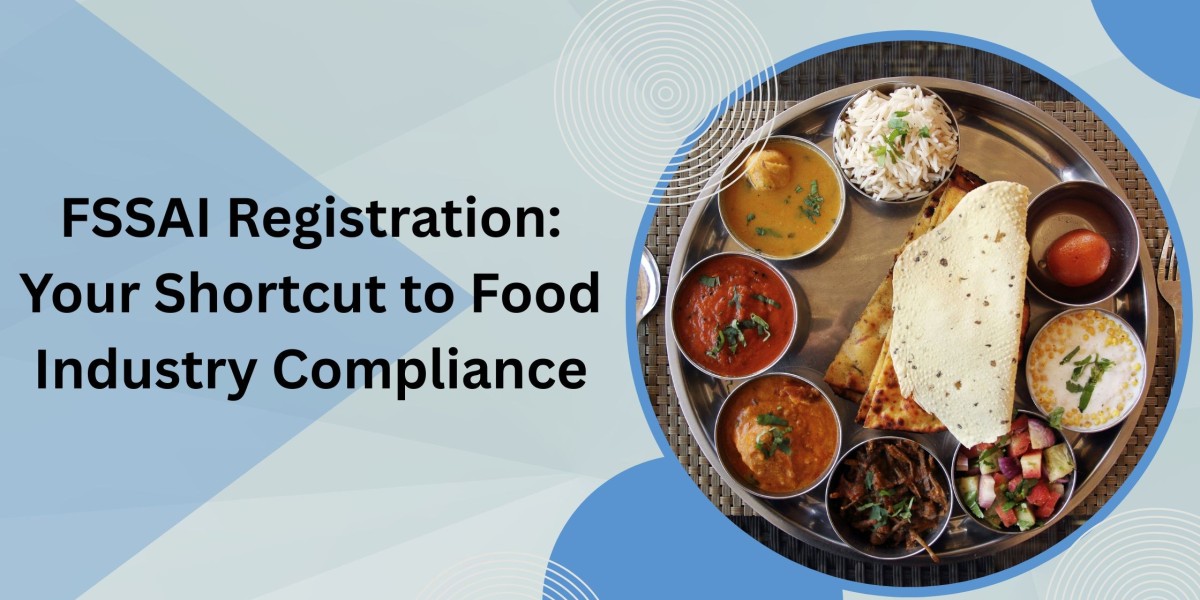If you're planning to start or already running a food-related business in India, FSSAI Registration isn’t just a legal formality; it’s a mandatory requirement. The Food Safety and Standards Authority of India (FSSAI) is the regulatory body ensuring that the food being sold, manufactured, distributed, or stored in India meets specific safety standards. Whether you own a small food stall, run a cloud kitchen, manage a restaurant, or operate a food manufacturing unit, FSSAI Registration provides the legal backbone for your operations. Beyond legality, it enhances your brand’s reputation, ensures customer trust, and opens doors to market opportunities. This guide explains everything you need to know about FSSAI Registration and how it serves as your shortcut to seamless compliance in the food industry.
What is FSSAI Registration?
Understanding FSSAI and Its Role
The FSSAI (Food Safety and Standards Authority of India) operates under the Ministry of Health & Family Welfare, Government of India. Its primary role is to regulate and oversee food safety, ensuring that consumers receive safe, hygienic, and standardized food products.
Types of FSSAI Licenses
Depending on the size and scale of your food business, you will need to apply for one of the following:
FSSAI Basic Registration: For small food businesses with turnover up to ₹12 lakh per annum.
FSSAI State License: For medium-sized businesses with turnover between ₹12 lakh and ₹20 crore.
FSSAI Central License: For large businesses with turnover above ₹20 crore or those involved in import/export.
Why FSSAI Registration is Crucial for Food Businesses
1. Legal Requirement
Operating without FSSAI registration can lead to heavy penalties, legal action, and possible closure of the business. It is mandated under the Food Safety and Standards Act, 2006.
2. Builds Consumer Trust
Displaying the FSSAI logo and license number on food packaging or premises signals to customers that your food complies with safety standards. This enhances trust and boosts your brand reputation.
3. Facilitates Business Growth
FSSAI certification is often necessary for:
Expanding your business
Supplying to large retailers or e-commerce platforms
Exporting food products
4. Ensures Food Quality and Safety
By registering with FSSAI, your business commits to maintaining hygiene standards, reducing the risk of foodborne illnesses, and adhering to best industry practices.
5. Access to Government Benefits
Registered businesses can access various government schemes, subsidies, and training programs aimed at supporting the food sector.
Who Needs FSSAI Registration?
Businesses Required to Register
If your business falls under any of these categories, FSSAI Registration is mandatory:
Manufacturers (small-scale, home-based units, etc.)
Food processors and packers
Traders and wholesalers
Food storage and distribution units
Retailers and food chains
Online food businesses and aggregators (Zomato, Swiggy)
Canteens, hotels, restaurants, and bakeries
Dairy farms and meat processing units
Exporters and importers of food products
Benefits of FSSAI Registration for Your Business
1. Legal Recognition
Having an FSSAI license validates your business and gives it a recognized identity in the food industry.
2. Improved Business Credibility
Customers, partners, and investors prefer businesses that comply with legal food safety standards.
3. Easy Market Expansion
Registration helps when expanding to new locations or collaborating with supermarkets and online platforms.
4. Quality Assurance
Regular checks and audits by FSSAI ensure your processes align with hygiene and safety norms, minimizing risks.
5. Increased Consumer Base
The FSSAI logo adds assurance to your product, influencing customer choices positively and driving repeat business.
Step-by-Step Guide to FSSAI Registration Process
Access the Official FSSAI Portal
Visit the official website for FSSAI registration to start your application process.
Fill in the Application Details
Provide accurate information, including your name, business details, type of food business, and upload necessary documents like your PAN card.
Review and Submit the Application
Carefully verify all the entered details before submitting the form.
Make the Payment
Pay the applicable fee online, based on the category of FSSAI license you require.
OTP Verification
Enter the OTP received on your registered mobile number or email to verify your identity.
Premises Inspection (If Required)
In certain cases, FSSAI officials may conduct a physical inspection of your business location.
Receive Your FSSAI License
Once approved, download your FSSAI registration certificate directly from the official portal.
Common Mistakes to Avoid During FSSAI Registration
1. Incorrect Documentation
Ensure documents are valid, updated, and match the details provided in the application form.
2. Choosing the Wrong License Category
Understand your business scale clearly to apply for the right type of license. Incorrect categorization can lead to rejection or legal issues.
3. Incomplete Application Form
Fill in all required fields accurately. Any discrepancies can delay the approval process.
4. Ignoring License Renewal
Failing to renew your license on time may attract penalties or cancellation of your registration.
Consequences of Operating Without FSSAI Registration
Under the Food Safety and Standards Act, 2006:
A fine of up to ₹5 lakh can be imposed for operating without a valid license.
Serious violations can lead to business closure and legal prosecution.
Offenders may face imprisonment for repeated or severe non-compliance.
Tips for Smooth FSSAI Compliance
1. Maintain Clean and Hygienic Premises
Ensure your food premises meet cleanliness standards to avoid issues during inspections.
2. Proper Record Keeping
Maintain updated records of procurement, production, and distribution as per FSSAI guidelines.
3. Train Staff on Hygiene Practices
Educate your team on safe food handling, storage, and sanitation procedures.
4. Label Products as per Guidelines
Ensure all packaged food labels include FSSAI license numbers and comply with labeling regulations.
Also Read: FSSAI license for Restaurants - Documents and process
Conclusion
FSSAI Registration isn’t just about compliance; it’s about credibility, quality, and growth. In the competitive food industry, having a valid FSSAI license builds trust with consumers, partners, and regulatory authorities. It also ensures you are contributing to a safer, healthier food ecosystem in India. With digital platforms simplifying the registration process, there’s no reason to delay. Begin your FSSAI registration today, and lay a solid, compliant foundation for your business success.








